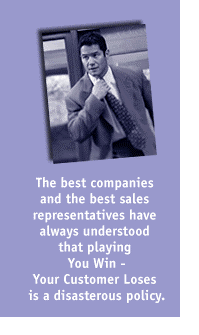
Unless it's Win-Win, you're bound to lose
| Ïðîäàæè | ||||
| Sales.com | ||||
| Keeping... | ||||
by Miller Heiman
 There
are four possible outcomes to every sale:
There
are four possible outcomes to every sale:
1. You Lose-Your Customer Loses
2. You Win-Your Customer Loses
3. You Win-Your Customer Wins
4. You Lose-Your Customer Wins
At first glance, it might appear that the odds are in your favor 3-1. But of those four endings, just one -- You Win-Your Customer Wins – will lead to continued success.
Clearly, no one wants a potential sale to end with both parties losing, but what’s so bad about you winning and your customer losing? After all, you made the sale, right? Well, you might enjoy a short-term win, but you’re almost certain to suffer long-term consequences.
The You Win-Your Customer Loses ending fuels the public’s notion that everyone in sales wants to manipulate prospects. Examples of this scenario abound in popular stories – from the used-car salesman who sets the odometer back to the appliance dealer who reneges on his warranty, from the messenger service that delivers your packages two days late to the mail-order house that doesn’t deliver it at all. Whether it follows from outright dishonesty or mere incompetence, the You Win-Your Customer Loses outcome has never been in short supply.
Typically, the You Win-Your Customer Loses outcome occurs when you fall into one of these four traps:
1. You sell someone something at an inflated price at a time when that person’s urgent business needs make it impossible for him or her to negotiate or refuse.
2. You describe the service capabilities of your firm unrealistically, leading the customer to believe that you’ll instantly correct any problem that might arise with your product.
3. You place a model in the buyer’s firm that’s more (or less) sophisticated than what’s really needed.
In each of these adversarial, and adventurist, scenarios, you’re sticking it to the buyer in exchange for a quick commission. But in spite of what the public has been led to believe, this “common” and “traditional” selling approach is neither common nor traditional – at least not among successful salespeople. The best companies, and the best sales representatives, have always understood that wherever repeat business is important, playing You Win-Your Customer Loses is a disastrous policy. The only positive thing you can get is the initial order. Often it also gets you the last thing any professional salesperson wants: a customer who is hell-bent on revenge.
Playing Win-Lose with anyone with whom you expect to have future business contacts isn’t in your self-interest because, sooner or later, the people you’ve allowed to Lose are going to discover that you’ve done them wrong. When that happens, the best you can hope for is that he or she will simply walk away and forget about you, nursing a case of Buyer’s Remorse in private. What’s much more likely is that he or she will counterattack by spreading the word around that you can’t be trusted. That’s buyer’s revenge. It can be deadly to your business years down the line.
Sometimes, of course, the payback is immediate. Consider the sale to the textile company of a troubleshooting program that never made it past the trial period because the sales representative had ignored the buyers needs. Ignoring them was tantamount to saying, “I don’t care about your self-interest. I can win here, even if you lose.” Their buyer’s revenge came very quickly, as they simply saw to it that the program didn’t perform as promised. And the ultimate outcome just as quickly became Lose-Lose.
Sometimes buyer’s revenge can take a little longer. About 15 years ago, a writer friend of ours co-authored a book with an aspiring actor. The book bombed, largely because the editor, who was frying much larger fish at the time, assigned it the lowest of priorities in her advertising budget. Our friend never forgot what he considered her mismanagement of the project, and a year ago, when the actor – by now a rising soap opera star – asked him to do a second book, he got his revenge. The editor naturally wanted to sign the television personality, but our friend told his collaborator, “Nothing doing. I’d love to do another book with you, but I won’t work with her again.” So they brought the book, with considerable fanfare, to another publisher.
We realize that our writer friend wasn’t a “buyer” in the technical sense. But he was, very clearly, what we call a Buying Influence, that is, he was able to directly influence the buyer. By playing win-Lose with that Buying Influence – all of 15 years ago – the editor had closed off a business opportunity for herself at the time she didn’t even imaging existed. The lesson is clear. Failing to consider every individual buyer’s self-interest is, in the long run, a self-defeating proposition. Or, to paraphrase a line from one of English literature’s greatest psychologists William Shakespeare: “Hell hath no fury like a Buying Influence scorned.”
Adapted from The New Strategic Selling Stephen E. Heiman, Diane Sanchez, with Tad Tuleja © 1998 by Miller Heiman, Inc. All rights reserved with permission of William Morrow & Company, Inc. and Warner Books